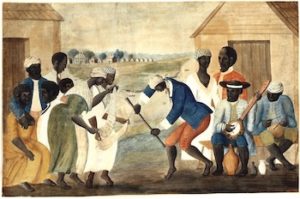
*Black history in folk music is celebrated on this date in 1820. This musical genre's representation, along with jazz, comes close to being the first truly American classical music.
As soon as Africans arrived through the Middle Passage, their culture gradually transformed into what some now call African American culture. They had to learn how to communicate with each other, as they arrived speaking many different languages. To adjust to the new sounds, surroundings, and customs, they gradually learned to combine the music and dances they brought from Africa with those of the Europeans.
As far back as Black Africans in North American cultural history stretches, it has been accompanied by a soundtrack of folk music. Some of the most timeless songs of empowerment and perseverance come from the American slaves and their communities of forced immigrants held in bondage throughout the Antebellum South. Black influence has been immeasurable. Some features view African American music as part of the Black African cultural continuum, representing struggles, joy, sorrow, empowerment, and perseverance. Black music of this era was a group activity integrated into daily life among the people of Africa. These aspects of African culture were easily adapted to the New World.
From the Chanteys (Virginia area) came work folk songs that were integrated into the Americas from Africa whenever people worked in groups. Accompanying the labor movement, the singing warded off fatigue, lifted their spirits, and enabled slower workers to keep up. This singing could accompany tasks such as picking cotton, laying railroad tracks, hoeing, and other forms of slave labor. Secular music retained characteristics associated with African music despite the influence of White European music. The dancing was immediately recognized by outsiders as non-European, even if the Africans now knew English or were born in the New World. The notation-al system designed for European music was the only way to preserve folk music before the rise of recordings.
Solomon Northup was a Black abolitionist and author of ‘Twelve Years a Slave,’ the first songbook to bring Black folk music to a wider audience. African American folk music inspires everything, from the blues and hip-hop to R&B. It is the base of all American music as it ties cultures together. Just like the music of today, folk music expresses the sorrows and pains of everyday life. But it also expressed unity, rejoicing, and happiness. Through the diaspora, we can hear Africa sounding different based on its region, but they all bring people together with the natural inclination to move to a melody or beat.
In the 20th century, Odetta was an artist who carried on the rich Black tradition of folk music. Many whites often treat this music and dancing, modifying and co-opting it to their comfort without acknowledging its unique origins, which are distinct from our flavor and style. “It had such a gargantuan effect on American culture, world culture,” Rhiannon Giddens says of the genre, which took root in the 1820s and ’30s. “This was the first time that tunes were written down. So, I’ve been going at it from a musicology point of view rather than looking at it as blackface and running screaming from the room.”